Can I eat potatoes while breastfeeding?
When breastfeeding, a woman can and should eat potatoes. It contains a lot of protein, dietary fiber, amino acids, vitamins and minerals that are important for the baby's growth and recovery after childbirth.
Of course, eating fried potatoes, chips and other high-calorie and fatty foods made from it is harmful. But we’ll talk about which of them are useful in the article.
Chemical composition, description and characteristics of potatoes
Potato tubers are 76.3% water. The share of dry matter accounts for 23.7%, including:
- starch;
- organic acids;
- proteins;
- mineral salts;
- pectin fibers;
- saturated fatty acids;
- Sahara;
- vitamin complex.
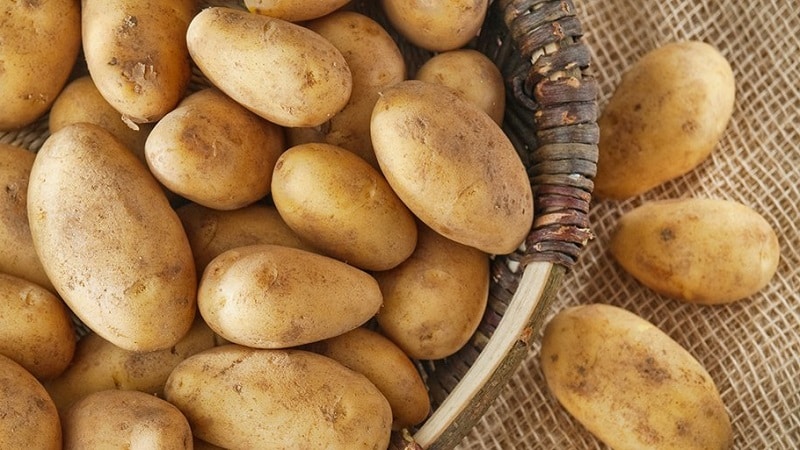
70–80% of all dry matter is starch. Its concentration in fruits depends on the early ripening of the varieties. Also, the level of starch decreases during storage, in particular at low temperatures.
Carbohydrates in potatoes include glucose, fructose, sucrose and maltose. (the latter is formed during the germination of root crops). Mature potatoes contain little sugar (within 1.5%). At a temperature of +10°C they accumulate in tubers, at higher temperatures they are consumed.
Dietary, taste and beneficial properties make potatoes an almost ideal product.. It is also used for the treatment and prevention of a wide range of diseases:
- it has a beneficial effect on the functions of the hematopoietic organs, cardiovascular, nervous and urinary systems, and digestive tract;
- prevents diabetes, obesity;
- alleviates the condition of people suffering from osteochondrosis, arthritis, arthrosis and other diseases of the musculoskeletal system;
- protects against atherosclerosis, influenza, upper respiratory tract infections, stabilizes blood pressure.
Ideally, you should eat potatoes from your own harvest or those grown in safe conditions.. To increase yields and reduce fruit ripening time, agronomists use chemicals and growth stimulants, and products to protect plants from bacteria and insects.
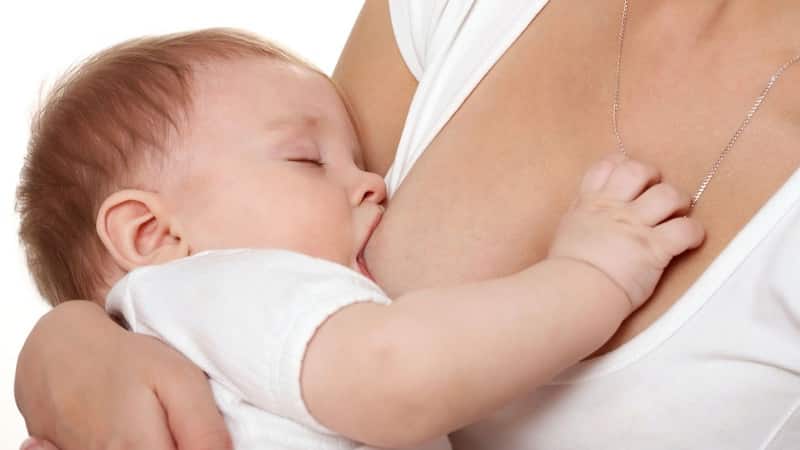
The soil and air can be contaminated. Potatoes accumulate nitrates and harmful compounds in peel and fruit, which can cause food poisoning, provoke vomiting, diarrhea, and stomach pain in a nursing mother and child.
Advice. If you buy potatoes in stores or at the market, be sure to pay attention to the appearance of the product and storage conditions. Ask the seller for a certificate from the State Sanitary and Epidemiological Supervision or other documents confirming the quality of the vegetable.
Vitamins and microelements
The biological value of potatoes is determined by their vitamin and mineral composition.. High doses of ascorbic (22.2%) and nicotinic (9%) acids, and pyridoxine (15%) were found in root vegetables. Contains vitamins in smaller amounts:
- A (beta-carotene);
- E (alpha tocopherol);
- N (biotin);
- K (phylloquinone);
- group B (thiamine, niacin, riboflavin, choline, pantothenic acid, folate).
Macronutrients presented:
- potassium;
- calcium;
- sodium;
- magnesium;
- silicon;
- gray;
- phosphorus;
- chlorine
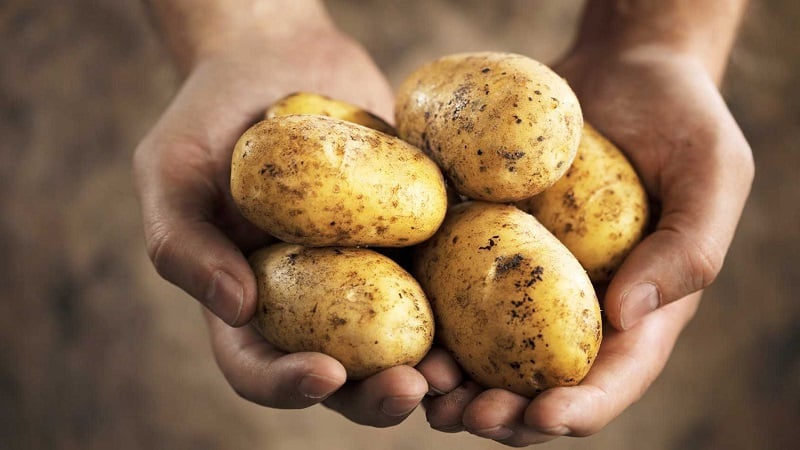
Microelements found in tubers:
- cobalt (50%);
- chromium (20%);
- copper (14%);
- iron;
- manganese;
- fluorine;
- iodine;
- molybdenum;
- zinc, etc.
Glycemic index
The glycemic index of potatoes depends on the method of cooking and varies from low to high. The highest GI is for baked potatoes - 95 units, mashed potatoes - 90 units, it is slightly lower for chips and fried potatoes - 80 units.
Boiled jacket potatoes have a glycemic index of 65–70 units. Raw potatoes have the lowest GI, but such potatoes are not recommended for a nursing mother.
Interesting on the topic:
Beneficial properties of potatoes during breastfeeding
Potatoes contain many beneficial substances that are important for infant growth. and recovery of a woman after childbirth:
- Vitamin A (retinol) - antioxidant, normalizes metabolism, important for healthy teeth and bones, strengthens the immune system.
- Vitamin C (ascorbic acid) - fights infections in the body, takes part in hematopoiesis processes, improves the condition of blood vessels and small capillaries, increases their strength and elasticity.
- Vitamin B1 (thiamine) - necessary for normal growth and development, supports the health of the digestive and cardiovascular systems.
- Vitamin B2 (riboflavin) - has a beneficial effect on the nervous system, reduces excitability, fights depression, and eliminates overstrain. It also normalizes blood circulation, lowers blood pressure, and, together with vitamin B9, creates new blood cells.
- Vitamin B4 (choline) - enhances intestinal and stomach peristalsis, stimulates the transmission of nerve impulses, improves memory and brain performance.
- Vitamin B5 (pantothenic acid) - takes part in metabolic processes, activates the formation of steroid hormones. During breastfeeding, the body's need for pantothenic acid increases from 11 to 20 mg.
- Vitamin B6 (pyridoxine) - affects the metabolism of amino acids and fats, protects against atherosclerosis, supports the activity of the nervous system.
- Vitamin B7 (biotin) — important for the health of tendons, prevents hair and nails from becoming brittle, ensures healthy skin, and normalizes the functioning of the gastrointestinal tract.
- Vitamin B9 (folic acid) — neurological damage, cancer, and anemia are associated with folate deficiency in a woman’s body. Their insufficiency before pregnancy and during the entire period of gestation can cause serious developmental defects in the baby, termination of pregnancy, and stillbirth.
- Vitamin E (tocopherol acetate) - helps a woman lose excess weight, supports metabolism in the heart and skeletal muscles, nervous system, liver, improves blood circulation.
- Vitamin K — creates favorable conditions for normal kidney function, participates in the absorption of calcium and vitamin D, regulates blood clotting processes, and takes part in the metabolism of bone tissue.
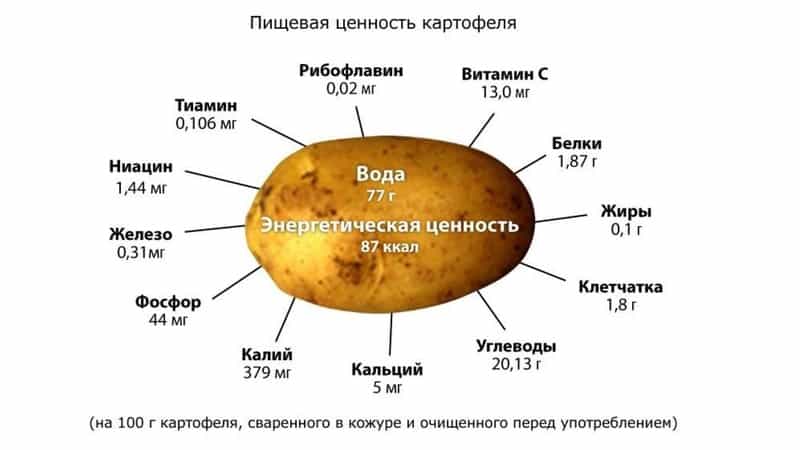
When breastfeeding, potatoes are valued for their content:
- calcium - participates in the construction of bone tissue, mineralization of teeth;
- magnesium - maintains a constant body temperature, has a vasodilating effect, relieves muscle spasms;
- iron - enriches brain tissue with oxygen, stimulates thinking and the development of cognitive functions;
- iodine - necessary for normal functioning of the thyroid gland and the growth of the child;
- copper and manganese - protect brain cell membranes from free radicals.
Possible harm and contraindications
 Despite all the positive properties of potatoes, The baby may experience allergic reactions in the form of itching, peeling, redness of the skin, rashes.
Despite all the positive properties of potatoes, The baby may experience allergic reactions in the form of itching, peeling, redness of the skin, rashes.
Excessive consumption of nitrate fruits causes food poisoning, nausea, vomiting, diarrhea, stomach pain.
Uncontrolled consumption of potatoes leads to constipation, intestinal colic in a newborn, which is associated with the starch content in tubers.
Among the contraindications to eating potatoes - allergies. It is recommended to limit portions or exclude it from the diet for people with type 2 and type 3 diabetes.
For reference. There is an opinion that potatoes cause excess weight due to their high starch content and high calorie content. But this is true if you overuse fried potatoes, mashed potatoes with added milk and butter, seasoning everything with sauces and mayonnaise.
What could be the danger?
A nursing mother should not eat green potato tubers.. They contain solanine, a toxic substance that first causes excitement and then depression of the nervous system, destroys red blood cells, disrupts kidney function, worsens skin condition, and provokes cancer.
Solanine can cause poisoning. Symptoms include vomiting, nausea, diarrhea, headache, intestinal spasm, and fever. But this is possible after eating several kilograms of green, unpeeled and thermally untreated potatoes.
Rules for eating potatoes during breastfeeding
It is better to eat homegrown varietiesthat do not contain chemicals or other harmful substances. In the first month, the mother should carefully try all the foods on the list of permitted ones, including potatoes.
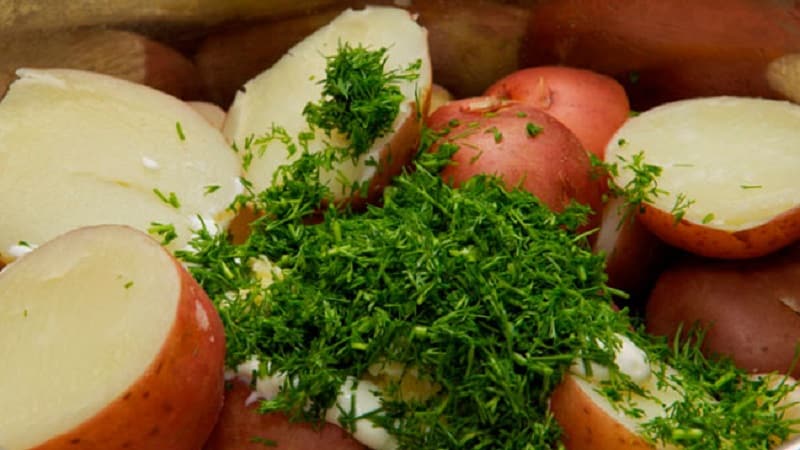
To find out how your newborn will react, you need to eat a little boiled or baked vegetables without fat and observe the reaction. If a woman did not suffer from allergies during pregnancy, then such negative manifestations will not occur when feeding the baby with breast milk.
You need to give up fried potatoes or mashed potatoes with added butter, milk, eggs. Firstly, all these products are highly allergenic, and secondly, they load the child’s immature digestive tract and cause flatulence, stomach pain, nausea, vomiting, and bloating. The list of restricted products includes raw vegetable tubers, juice, high-calorie dishes based on it: chips, snacks, french fries.
When planning meals in the first month, it is better to give preference to purees prepared in water with the addition of a few drops of olive oil. This dish will help improve the process of bowel movement after childbirth and activate gastrointestinal motility. Later, you can eat baked and boiled potatoes, add them to salads, soups, use them as a filling for dumplings, and prepare potato pancakes.
For reference. Breastfeeding experts recommend keeping a food diary. It will help you create a list of foods that a nursing mother can and cannot eat.
Young potatoes are best consumed during the ripening season. Early varieties are most likely saturated with nitrates, which will cause intoxication. It is better to eat potatoes separately or together with other vegetables and fresh herbs.You cannot combine it with meat products, as they are heavy on the stomach and require a lot of energy to digest them.
Recipes with potatoes for nursing mothers
Thanks to the variety of potato-based dishes, you can make the diet of a nursing mother is tasty, healthy and with minimal time spent on preparation.
Potatoes and meat stewed in a slow cooker
Ingredients for 6 servings:
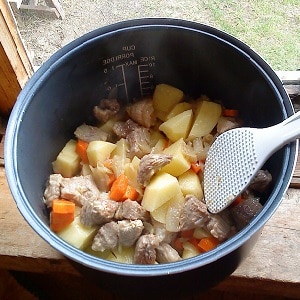 potatoes - 1 kg;
potatoes - 1 kg;- dietary meat (beef, veal) - 500 g;
- onions - 1 pc.;
- carrots - 1 pc.;
- tomatoes - 2 pcs. or 1 tsp. tomato paste;
- water - 1 l;
- vegetable oil - 2 tbsp. l.;
- Bay leaf;
- salt and herbs to taste.
Recipe:
- Rinse the meat, remove excess moisture with a paper towel, cut into small pieces.
- Heat vegetable oil in a preheated multicooker bowl, add meat, cook with the lid open on the “Fry” mode until a slightly golden crust forms.
- Cut the onion into small cubes, grate the carrots. Add to meat. Cook with the lid closed for 15 minutes until the vegetables become soft.
- Peel the potatoes, cut into medium-sized pieces, add to the meat and vegetables. Pour boiling water over everything. The amount of water can be changed depending on the desired consistency.
- Add tomato paste or finely chopped peeled tomatoes, bay leaf, salt, and mix everything.
- Cook for 40–50 minutes on the “Stew” mode. Before serving, decorate with herbs.
Baked potatoes with cheese
Ingredients:
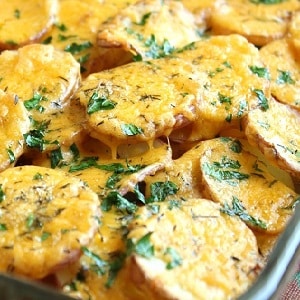 potatoes - 1 kg;
potatoes - 1 kg;- low-calorie cheese (for example, Mozzarella, Suluguni) - 150 g;
- vegetable oil - 1 tsp;
- salt - to taste;
- greenery.
Recipe:
- Peel the potatoes, cut into small circles.
- Grease a baking dish with oil and distribute the potatoes evenly.
- Salt and add spices (it is better to use dried herbs). Sprinkle grated cheese on top.
- Cover with foil. Bake in a preheated oven for 30–40 minutes at +180°C.
- Remove the foil and leave in the oven for another 10-15 minutes until golden brown.
Casserole
Products:
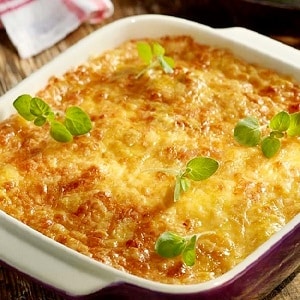 potatoes - 0.5–0.7 kg;
potatoes - 0.5–0.7 kg;- Mozzarella cheese - 150 g;
- low-fat milk - 100 ml;
- sour cream - 100 g;
- butter - 50 g;
- egg - 1 pc.
Preparing potato casserole:
- Peel the tubers, cut into 4–6 parts (depending on the size of the fruit), cook until tender.
- Drain the water from the potatoes, add all the ingredients except cheese, add salt, and grind well until smooth.
- Place the potato mixture in a baking dish, smooth it out, spread sour cream on top, and sprinkle with grated cheese.
- Preheat the oven. Bake at +180–200°C for about 30–40 minutes.
Potatoes with cottage cheese
Products per serving:
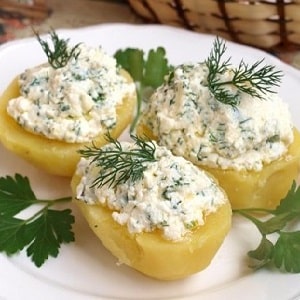 potatoes - 2 pcs.;
potatoes - 2 pcs.;- low-fat cottage cheese - 50 g;
- sour cream 15% fat - 50 g;
- garlic - 1 clove;
- salt and herbs to taste.
Recipe:
- Wash the potatoes in their skins well, remove the adventitious buds (eyes).
- Bake whole tubers in the oven until done.
- Prepare the filling from cottage cheese, finely chopped herbs and garlic, mix and add salt to taste.
- Make a cross-shaped cut in the warm potatoes and fill with filling.
The dish goes well with fresh vegetables.
Potato soup
This soup coats the mucous membranes of the stomach, warms and perfectly saturates the body.
You will need:
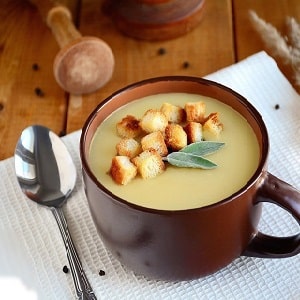 water - 450 ml;
water - 450 ml;- potatoes - 250 g;
- milk - 200 ml;
- wheat flour - 1 tbsp. l.;
- butter - 20 g;
- chicken egg - 1 pc.;
- salt;
- greenery.
Cooking process:
- Cut the peeled potatoes into cubes and cook over medium heat for 20 minutes.
- Add flour, mix. Remove from heat.
- Mix the cooled mixture in a blender. Bring to a boil again.
- Mix milk with egg and add to soup.
- Beat it in a blender again and boil.
- Before serving, season with butter and fresh herbs.
Potato cutlets
Potato cutlets are an excellent alternative to meat cutlets due to their high protein content. But due to the presence of fish in the recipe, it is not advisable to include such a dish in the diet of a nursing mother in the first month.
Will be needed:
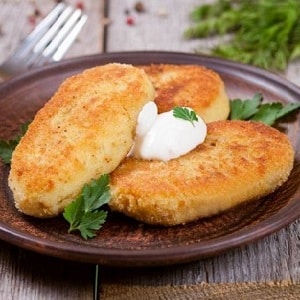 potatoes - 2-3 pcs.;
potatoes - 2-3 pcs.;- canned pink salmon - 150 g;
- chicken egg - 1 pc.;
- bread crumbs - 100 g;
- garlic - 1 clove;
- lemon juice - 1 tbsp. l.;
- pickled cucumber - 1 pc.;
- salt to taste.
Preparation:
- Boil the potatoes in their skins, peel and mash with a fork.
- Grate the pickled cucumber, squeeze out the juice lightly, and add to the potatoes.
- Put 50 g of crackers, chopped garlic, lemon juice, salt, pink salmon, egg there, mash everything well, mix until smooth.
- Form minced meat into cutlets and roll in breadcrumbs.
- Cover a baking sheet with parchment, grease with vegetable oil, and place the cutlets.
- Bake in a preheated oven for 15-20 minutes until golden brown. Turn over to the other side and leave for another 5-7 minutes.
Potato banana cookies
This is a delicious dietary dessert that is prepared without flour.
Ingredients:
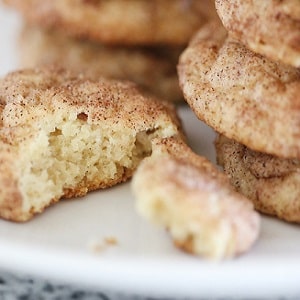 potatoes - 0.5 kg;
potatoes - 0.5 kg;- ripe bananas - 2 pcs.;
- chicken egg - 1 pc.
The recipe is simple:
- Boil or bake potato tubers in their skins. Cool, clean.
- Blend together with the banana in a blender until smooth.
- Add egg, mix well.
- Roll out the dough into a thin layer, use special molds or a regular glass to cut out cookies.
- Line a baking sheet with parchment, place cookies, bake in a preheated oven for 25–30 minutes at +180°C.
Read also:
Effective recipes for potato eye masks
Doctors' advice and Komarovsky's opinion

Doctors advise trying different foods while breastfeeding. The body itself will tell you what you need to eat in order to provide your baby with nutrients without harming his health.
Potatoes have a low degree of allergenicity, and usually the baby’s body responds well to the vegetable. You only need to exclude fried potatoes, chips, french fries.
When asked whether nursing women can eat potatoes, Dr. Komarovsky replies: “Medical science categorically rejects any diets for nursing mothers. Everything that a woman ate before pregnancy and during its course can be eaten after the birth of the baby.. The only thing is that you shouldn’t experiment with food.”
Reference. Evgeniy Olegovich Komarovsky is a pediatrician, TV presenter, and author of books on children’s health.
Please note that Over time, a newborn's potato allergy may go away, especially after three months.
Conclusion
Proper nutrition for a nursing mother is the key to the baby’s health, since the baby receives all the beneficial substances through breast milk.
Potatoes are a natural source of vitamins and minerals. It should be prepared without oil or fat and introduced into the diet gradually to prevent allergic reactions in the child.Before eating potato dishes, be sure to consult with a specialist, because your health and your baby’s health comes first.